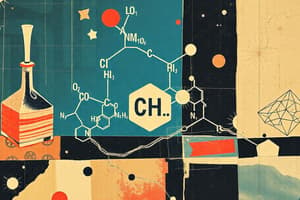Podcast
Questions and Answers
What are hydrocarbons?
What are hydrocarbons?
Organic compounds that are the simplest type that contain only hydrogen and carbon atoms.
What are chain aliphatic hydrocarbons?
What are chain aliphatic hydrocarbons?
Compounds consisting of carbons linked either in a single chain or in a branched chain.
What are cyclic hydrocarbons?
What are cyclic hydrocarbons?
Aliphatic compounds that have carbon atoms linked in a closed polygon.
What are alkanes?
What are alkanes?
What are alkenes?
What are alkenes?
What are alkynes?
What are alkynes?
What does aromatic refer to in hydrocarbons?
What does aromatic refer to in hydrocarbons?
What are propane and butane used for?
What are propane and butane used for?
What happens when bromine reacts with alkanes?
What happens when bromine reacts with alkanes?
How do alkenes react with concentrated sulfuric acid?
How do alkenes react with concentrated sulfuric acid?
What is the purpose of the experiment discussed?
What is the purpose of the experiment discussed?
Why does oil spread quickly on the surface of water during an oil spill?
Why does oil spread quickly on the surface of water during an oil spill?
Study Notes
Hydrocarbons
- Organic compounds composed exclusively of hydrogen and carbon atoms.
- Insoluble in water but mix well with non-polar solvents.
- Most hydrocarbons have a density lower than water.
- Crude oil and its products consist of various hydrocarbon mixtures.
Chain Aliphatic Hydrocarbons
- Comprised of carbon atoms linked in straight or branched chains.
Cyclic Hydrocarbons
- Feature carbon atoms connected in a closed-loop or polygon structure.
Alkanes
- Characterized by the presence of only single carbon-carbon bonds.
- Also known as saturated hydrocarbons due to the lack of double or triple bonds.
Alkenes
- Defined by the presence of at least one carbon-carbon double bond.
- Considered unsaturated due to their ability to form additional bonds.
Alkynes
- Contain at least one carbon-carbon triple bond.
- Classified as unsaturated compounds due to the presence of triple bonds.
Aromatic Hydrocarbons
- Cyclic structures housing a closed loop of electrons.
- Known for their stability and resistance to reactions.
- React only with bromine in the presence of catalysts like iron fillings or aluminum chloride.
Propane and Butane
- Commonly used as fuels for heating or cooking.
- Combustion of these hydrocarbons results in carbon dioxide and water.
Bromine Reaction
- Bromine solution is red; a loss of color in the presence of hydrocarbons indicates a reaction.
- Alkanes do not react with bromine, maintaining the red color.
Reactions with Concentrated Sulfuric Acid
- Alkenes undergo addition reactions with cold concentrated sulfuric acid.
- Saturated hydrocarbons (alkanes) and aromatic compounds are generally unreactive with sulfuric acid.
Purpose of Experiment
- Demonstrates chemical reactivity differences among alkenes, alkanes, and aromatics using various reagents.
- Investigates physical properties, solubility, and density of selected hydrocarbons.
- Aims to use physical and chemical properties for identifying unknown substances.
Oil Spills
- Oil slicks develop when hydrocarbons spill in water, spreading rapidly at the surface.
- This occurs due to their insolubility in water, allowing them to float and spread.
Studying That Suits You
Use AI to generate personalized quizzes and flashcards to suit your learning preferences.
Description
Explore the realm of hydrocarbons through these flashcards that define essential concepts in organic chemistry. Understand the differences between various types of hydrocarbons, including chain aliphatic hydrocarbons and their properties. Ideal for students studying organic compound classifications.




